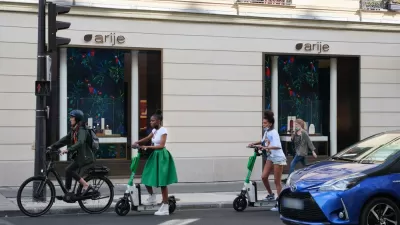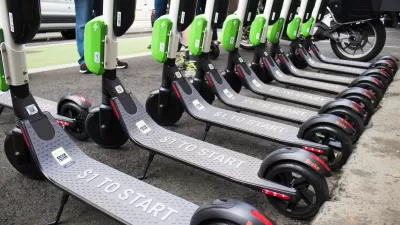Transportation experts warn that mandatory helmet laws for shared e-scooters could cripple the nascent industry and discourage casual rides.

With Miami becoming the largest U.S. city to implement a helmet law for e-scooter riders, some micromobility advocates warn that the mandate will stunt the growth of the industry and impose an undue barrier that will discourage ridership, reports Jason Plautz. E-scooter supporters worry that despite initiatives on the part of operators to distribute helmets, the requirement will lead to reduced scooter trips when people inevitably forget their helmets at home or want to take an unplanned ride.
Unlike past attempts to impose helmet laws, scooter operators are not fighting the mandate, saying they will ramp up existing efforts to incentivize voluntary helmet use and work with cities to prioritize safety and find effective ways to distribute helmets and enforce regulations. To ensure compliance, operators Bird and Helbiz have introduced a feature that requires riders to take a photo of themselves wearing a helmet before starting a ride. Operators also plan to place helmets with their vehicles, but distribution strategies have proven difficult. Wheels, which touts its "safety-first" approach, redesigned its devices to accommodate helmets in 2019.
Yet transportation experts point out that despite the benefits of individual helmet-wearing, top-down mandates often "do more harm than good." Seattle's Pronto bike share system, which shut down in 2017, saw drastically reduced ridership after a helmet law was instituted in that city. For transportation advocates, safety begins with infrastructure.
FULL STORY: Scooter helmet laws pit safety against accessibility

Maui's Vacation Rental Debate Turns Ugly
Verbal attacks, misinformation campaigns and fistfights plague a high-stakes debate to convert thousands of vacation rentals into long-term housing.

Planetizen Federal Action Tracker
A weekly monitor of how Trump’s orders and actions are impacting planners and planning in America.

In Urban Planning, AI Prompting Could be the New Design Thinking
Creativity has long been key to great urban design. What if we see AI as our new creative partner?

King County Supportive Housing Program Offers Hope for Unhoused Residents
The county is taking a ‘Housing First’ approach that prioritizes getting people into housing, then offering wraparound supportive services.

Researchers Use AI to Get Clearer Picture of US Housing
Analysts are using artificial intelligence to supercharge their research by allowing them to comb through data faster. Though these AI tools can be error prone, they save time and housing researchers are optimistic about the future.

Making Shared Micromobility More Inclusive
Cities and shared mobility system operators can do more to include people with disabilities in planning and operations, per a new report.
Urban Design for Planners 1: Software Tools
This six-course series explores essential urban design concepts using open source software and equips planners with the tools they need to participate fully in the urban design process.
Planning for Universal Design
Learn the tools for implementing Universal Design in planning regulations.
planning NEXT
Appalachian Highlands Housing Partners
Mpact (founded as Rail~Volution)
City of Camden Redevelopment Agency
City of Astoria
City of Portland
City of Laramie





























